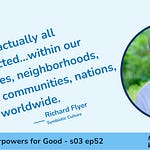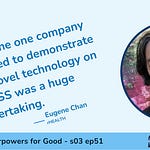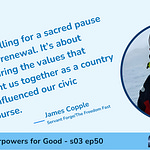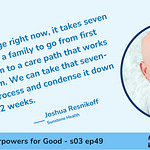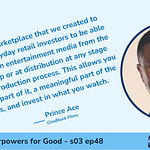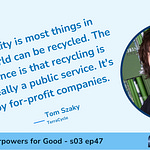Devin: What superpower would you say you have learned from President Jimmy Carter?
Jan: The greatest thing that I carry with me today and try to use in all my life and share with my children and other people is when he spoke one Sunday, he said if everybody would be kind and giving to the person in front of them—if we all did that, would we have a better world?
Jan Williams and Zac Steele know President Jimmy Carter well. On a visit to Plains, Georgia, I visited with them at the Maranatha Baptist Church, where the 39th President taught Sunday school for four decades following his time in Washington.
Plains is the tiny rural town in southwestern Georgia where Mr. Jimmy, as locals call him, was born, raised and has lived his entire life except for short stretches residing in government housing in Atlanta as Georgia’s Governor and Washington, DC as President. (Read about what to see and do in Plains in the newsletter I write with Gail.)
During my visit, I chatted with other locals less formally about their experiences with the former President. They gushed with stories. One relatively new resident boasted that the Carters, then well into their 80s, came by to visit and welcome her to Plains when she moved to town. She’s had the Carters over for dinner often enough to count them as personal friends.
It would take a book to properly make the case that Mr. Jimmy is the greatest living American. For now, I’ll ask only that you read this piece with the understanding that I believe it to be true. While under-appreciated as President, he is universally acclaimed for his work, quietly executed, since.
Winning the Nobel Peace Prize in 2002 at age 78 would be a capstone for most people but was more of a mid-career milestone for Mr. Jimmy. He remained fully active, despite cancer and other challenges, into his mid-90s. He famously showed up at his annual Habitat for Humanity build with fresh stitches from a fall.
The Carter Center he founded works to make lasting peace amidst conflict, assure democratic elections around the world and fight disease, focusing on Guinea worms. In 1986, before the Center tackled the problem, there were millions of cases each year. So far in 2022, there have been two cases. Yes, you read that right. Two cases.
Well aware of his work and reputation as a humanitarian, those who know him best see a deeply faithful Sunday School teacher. His final lesson in the fall of 2019 was about “being ready to go to heaven,” Jan Williams, a member of the Maranatha Baptist Church and a retired school teacher, says.
Though that final lesson coincided with the outbreak of COVID-19, Mr. Jimmy decided to retire at the age of 95 due to his health.
People came from around the world to attend Sunday School lessons taught by Mr. Jimmy. He taught whenever he was in town. The line formed the night before. Those wishing to attend slept in their cars in the church parking lot or on the street. As they arrived, Jan and her team gave each car a number that determined their spot in the queue the following morning.
Before entering, the secret service wanded the guests to check for weapons. They strongly discouraged bags and thoroughly inspected the ones people brought.
Following the Sunday School lesson, the Church hosted a worship service that the Carters always attended. Following the worship service, those who wanted could queue up for a photo with them. Everyone did.
Jan, who taught the Carters’ youngest child, Amy, in the fourth grade, accompanied the family to help care for Amy at the inauguration.
“He is a very humble person,” Jan says of Mr. Jimmy. “He doesn’t like for you to give him any praise. He’s expressed that to me many times because I get to see the effect he has on other people when he was teaching, and I would want to tell him a little story, and he’d say, ‘Gee, you know, I don’t want to hear any praise.’”
He makes Plains a unique place. Jan says he is the only President to have lived his entire life in one town. He was born in Plains but lived a few miles outside town growing up. Today, he lives in the 3,200-square-foot home the Carters built on their property in 1961. Zillow estimates the value at $240,000.
Jan takes some credit for the former President’s choice. To me, she said, “To tell you the honest truth,” and as an aside to him, she says, “Mr. Jimmy, you know this.” Then, back to me, she says, “I was surprised when he won. I really was.”
“When he did win, I did ask him, ‘What are your plans after you’re no longer the President?’ And he said, ‘I’ll come back to Plains, that’s home,’” she says. “And I said, ‘I’ll hold you to that.’”
Many in Plains were heartbroken by the defeat in 1980. Jan recounted that experience:
Mrs. Carter was the most devastated. She took it personally that people voted against her husband. Of course, the incident with the hostages kind of took us all down.
He started immediately wanting to work on the Carter Center. So, he got busy out trying to meet important people and raise money. She just kind of stayed at home.
We knew how we felt. We were sad, too. And I think an ironic thing from above was that when he came home after [President Reagan’s] inauguration in Washington and he was no longer the president, and when he landed here in Plains on Marine One, the clouds opened up and it flooded rain.
I took that as a sign from above that maybe even heaven was crying, that he wasn't going to be our president again. I really did. I took that as a great symbol.
Jan learned the superpower of kindness from Mr. Jimmy.
How to Develop Kindness As a Superpower
Jan describes how the lesson pervades Plains culture.
My Sunday school teacher now is Kim Fuller, who is his niece.
She said the other day, she was in a store, and a lady in front of her didn't have enough money to pay for her groceries. Kim said, “I'll pay.”
My Sunday schoolteacher lives life like her uncle does. And the lady said, ‘Ma'am, it's 40 something dollars.’
She said, “I don't care how much it is. You have children. I will pay for your food.”
Mr. Jimmy manifested kindness routinely. Jan shared a favorite example of that.
I had a group of people here one Sunday, and this lady, they came on a bus, a tour bus. She said, “My little sweet man who has a cane, has cancer, and he doesn't have long to live. But this was a lifelong dream. He was in the Navy. He got out the year before Mr. Jimmy did, but their paths didn't cross.”
And she said, “Is there any way, any way that President Carter could just speak to him?”
Well, there's one request out of 600 more, you know. I said, “Let me think about it and I'll see if I feel it.”
I don't ask him. Never did. Never will ask him to do favors. Yeah, but I went to him and I said, “President Carter, there's a man out here who is in the Navy and he's dying of cancer. And this is probably his last trip and this is what he wanted to do.”
I said, “If you feel led from above, would you just step over and speak to him before you start your class?”
And he kind of looked at me. “He said, this really means something to you, doesn't it?”
I said, “I'm asking from the bottom of my heart.”
I said, “I'll tell you what I'll do. I'll stand by the little man.”
“Where?” He's saying because he's on the front row. “If you feel led, you come over to that little man.”
He said, “Okay.”
Well, every time he came in, he told everybody good morning. And he'd say, “Do we have any visitors?” A church full! And he did some other things. I'm just standing there, kind of looking at him thinking, have you forgotten what I asked you to do?
All of a sudden, somebody coughed over where I was standing, and he looked over, and he remembered. He said, “If everybody will wait just a minute, I have something special I want to do this morning.”
So he walked over to the little man and knelt down in front of him and held his hands and said, “I understand you're kind of sick.”
The little man was crying. He said, “I just want you to know I thank you for your service to my country and that when you go back home today, you'll know that Rosalynn and I are praying for you.”
Then he got up and went back and started the lesson.
The lady that brought him to Plains told me that within two weeks he passed away. But he told everybody about what President Carter did special for him.
The former President converted his garage into a woodworking shop after his time in Washington. Jan says, “When President Carter joined our church in 1981, he asked me what I would like for him to make.”

“I said, ‘Oh, I’d love for you to make some beautiful collection plates,’” Jan says, holding up a collection plate. “So this is Philippine Mahogany. He did all the woodworking on it. Mrs. Carter put in the felt.”
“I said, ‘Now you’ve got to sign it somewhere.’ So on the bottom of the plate, he put a JC.” She affirmed that even when JC, meaning Jimmy Carter, isn’t in the building, JC, meaning Jesus Christ, is.
Mr. Jimmy also made the cross that hangs in the sanctuary.
Devin: What is a superpower you have learned from Jimmy Carter?
Zac: Probably the way he treats human beings.
Zac Steele, at age 36, is the youngest Deacon in the church. He summarizes his responsibilities as a Deacon as “any duties as assigned.”
One duty is to visit the Carters on Sunday mornings to help them set up the television to watch the live stream of the services. I visited with him just a few hours after his latest visit to their home.
He described receiving the “Same old toothy grin that Mr. Carter’s been giving for years.”
“Usually, it takes me a few minutes to get it set up,” Zac says. “So, we’re talking church, and that conversation usually slides onto some Braves baseball while we’re trying to get to church.”
Not having heard the conversation I had with Jan, he describes a similar kindness in how Mr. Jimmy treats human beings.
“I’ve got a cell phone right here with a message on it,” Zac says. “I’ve got my birthday voicemail from both of them during the pandemic where they couldn’t get out and visit. But, you know, I’ve got a ‘happy birthday, Zac’ call ‘thinking about you.’”
Noting that public figures often fail to live up to their public image upon closer inspection, the Carters are the opposite. “You see the work they do as humanitarians,” Zac says. “But, there’s a lot more to them than what people give credit for.”
Zac’s day job was teaching at the Georgia State Fire Academy. A few years ago, he mentioned to Mr. Jimmy that he’d be doing a class in Plains. Not thinking much of it, the former President said, “I’d love to see that.”
On the day of the training, the secret service agent in charge called Zac to ask him to hold the training for an hour or so to allow President Carter to see it. He watched the class from his car.
Zac, on rare occasions, teaches the Sunday School class. Once, with his parents, sister and nieces in attendance to support him, the Carters attended church in person. They sat with his family. Zac described the “class and character” he demonstrated to his family as “incredible.”
I asked Zac how to emulate President Carter. Zac made the case that it couldn’t be done. After describing the almost frantic pace of the work President Carter has kept working for peace and global health in his advancing years, he said, “I mean, who does that stuff anymore? It’s just absolutely unheard of.”
It sounds to me the way you’d describe the greatest living American.











